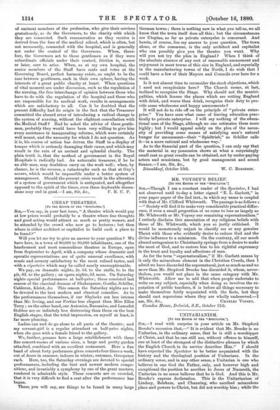CHEAP THEATRES.
[TO THE EDITOR OF THE "SPECTATOR.") SIR,-Y011 say, in your last issue, " A theatre which would pay at low prices would probably be a theatre where fine thoughts and good acting would attract as much as pretty women, and be attended by the crowd who now go to lectures ; but then -where is either architect or capitalist to build such a place to be found ?"
Will you let me try to give an answer to your question ? We have here, in a town of 80,000 to 90,000 inhabitants, one of the handsomest and most commodious theatres in Europe, open from September to April, with a company whose dramatic and operatic representations are of quite unusual excellence, with music and scenery satisfactory to the most refined tastes, and with a repertoire which may be called nearly unexceptionable.
We pay, on dramatic nights, 2s. 6d. to the stalls, ls. to the pit, 6d. to the gallery; on opera nights, 6d. more. On Saturday nights special performances at hall-price; these consisted last season of the classical dramas of Shakespeare, Goethe, Schiller, Calderon, Kleist, &c. This season the Saturday nights are to be devoted to the best modern and classical comedies. As to the performances themselves, if our Shylocks are less intense than Mr. Irving, and our Portias less elegant than Miss Ellen Terry ; on the other hand, our Antonios, Bassanios, and Lancelot Gobbos are so infinitely less distressing than those on the best English stages, that the total impression, on myself at least, is far more pleasing.
Ladies can and do go alone to all parts of the theatre ; and my servant-girl is a regular attendant on half-price nights, when she goes with a female friend to the gallery.
We, further, possess here a large establishment with three fine concert-rooms of various sizes, a large and pretty garden attached, combined with an excellent restaurant. Here a fine band of about forty performers gives concerts four times a week, out of doors in summer, indoors in winter; entrance, threepence each. Here, too, the Saturday evenings are devoted to special performances, including the best and newest modern compo- sitions, and invariably a symphony by one of the great masters, rendered in admirable style. These concerts are so crowded, that it is very difficult to find a seat after the performance has begun.
These, you will say, are things to be found in many large German towns ; there is nothing new in what you tell us, we all know that the town itself does all this ; but the circumstances are Utopian, as far as private enterprise is concerned. And herein, of course, lies my answer to your question. The town alone, or the commune, is the only architect and capitalist who can possibly give you the theatre you want. Why will you not try the plan in England ? When I think of the absolute absence of any sort of reasonable amusement and enjoyment in most towns of this size in England, and especially in the manufacturing towns of the North, I do wish that I could have a few of their Mayors and Councils over here for a week.
Is it not almost time to reconsider the stock objections, which 1 need not recapitulate here ? The Church seems, at last, inclined to recognise the Stage. Why should not the munici- palities, which license the places which are rotting England with drink, and worse than drink, recognise their duty to pro- vide some wholesome and happy amusements P It will not do to ride off on the principle of " private enter- prise." You have seen what came of leaving education prac- tically to private enterprise. I will say nothing of the educa- tional uses of the Stage, although no one estimates them more highly ; but I would appeal solely on the plea of the neces- sity of providing some means of satisfying men's natural hunger for amusement—their " Spieltrieb," as Schiller calls it—in a more rational and wholesome way.'
As to the financial part of the question, I can only say that the material in my possession shows at what a surprisingly small cost so great results can be obtained, not by under-paying actors and musicians, but by good management and sound. finance.—I am, Sir, &c.,


































 Previous page
Previous page